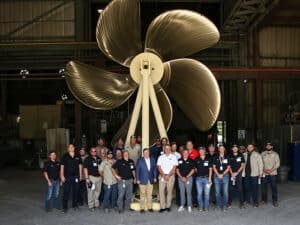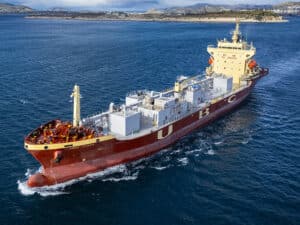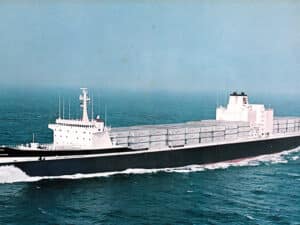
Columbia Shipmanagement cops plea, will pay $10.4 million
Written by Nick Blenkey MARCH 22, 2013 — The U.S. Department of Justice says that Columbia Shipmanagement (Deutschland) GmbH (CSM-D), a German corporation, and Columbia Shipmanagement Ltd. (CSM-CY), a Cypriot company, have agreed to pay a $10.4 million penalty and be placed on probation for four years, under a a multi-district plea agreement arising out of charges brought in the District of New Jersey and District of Delaware.
MARCH 22, 2013 — The U.S. Department of Justice says that Columbia Shipmanagement (Deutschland) GmbH (CSM-D), a German corporation, and Columbia Shipmanagement Ltd. (CSM-CY), a Cypriot company, have agreed to pay a $10.4 million penalty and be placed on probation for four years, under a a multi-district plea agreement arising out of charges brought in the District of New Jersey and District of Delaware.
The two companies yesterday pleaded guilty to felony obstruction of justice charges and violating the Act to Prevent Pollution from Ships related to the deliberate concealment of vessel pollution from four ships that visited U.S. ports in New Jersey, Delaware and Northern California.
At a press conference in Newark, NJ, yesterday, officials said that $2.6 million of the $10.4 million penalty will be used address environmental damage caused by Hurricane Sandy.
During probation, the companies will be subject to the terms of an environmental compliance program that requires outside audits by an independent company and oversight by a court appointed monitor.
The companies admitted that four of their ships, the tankers King Emerald, Nordic Passat and Cape Taft and the containership Cape Maas, had intentionally bypassed required pollution prevention equipment and falsified the oil record book, a required log regularly inspected by the U.S. Coast Guard.
An investigation into the M/T King Emerald was launched on May 7, 2012, after several crew members provided cell phone photos and other evidence to Coast Guard officers conducting a routine inspection. The King Emerald was engaged in various types of illegal discharges of bilge waste dating back to at least 2010. In pleading guilty, the defendants admitted that illegal discharges of both sludge and oily bilge waste were discharged at night off the coast of Central America, including a discharge within the Exclusive Economic Zone of Costa Rica where a national park is located. The ship’s second engineer pleaded guilty previously and will be sentenced in Newark on April 3, 2013.
The Delaware investigation began in October 2012, after several crew members of the M/T Nordic Passat provided the Coast Guard with a thumb drive containing photographs and video showing how illegal discharges had been sent overboard through the ship’s sewage system. They also alleged that sludge had been put into the ship’s cargo tanks and that logs showing sludge had been incinerated onboard had been falsified.
The charges involving the M/V Cape Maas stem from a whistleblower report to the Coast Guard when the ship visited the port in San Francisco. He provided a video showing the operation of the oily water separator pumping overboard without the use of the oil content monitor to detect and prevent oil from being illegally discharged.
Just two weeks prior to yesterday’s plea, the defendants and their attorneys disclosed violations on a fourth ship, the M/T Cape Taft that was then anchored in New York waters and destined for New Jersey. After the ship disclosed problems to the company, an internal investigation revealed that the ship’s oily water separator had been used improperly for some time. Instead of sensing a sample of overboard discharges, it was instead flushed with fresh water by the crew. The ship’s oil record book was revised by CSM-D to reveal 16 instances where it was false. The defendants cooperated with the investigation and provided the government with video replays of the oil content monitor showing when the crew had “tricked” the sensor with fresh water.
In pleading guilty, says the Department of Justice, the defendants have admitted the following in a detailed joint factual statement filed in court:
- The King Emerald oil tanker used three different methods to illegally dispose of oily bilge waste. In April 2012, approximately five tons of oily waste was discharged in the exclusive economic zone of Costa Rica approximately 45 miles from a national park.
- At least three chief engineers and the second engineer were involved in illegal discharges and intentional falsification of the oil record book for the King Emerald. In one instance, the oily water separator was operated solely for the purpose of generating data on the ship’s electronic recording device to account for an illegal discharge that had already taken place.
- During the Coast Guard boarding in Carteret, N.J., the second engineer lied to inspectors and then hid a valve used to make illegal discharges in an overhead space on the ship.
- Oil contaminated bilge waste was illegally pumped overboard from the M/T Nordic Passat on the orders of the chief engineer and second engineer with a portable pump and “magic hose” that was draped down three levels of the engine room to dump overboard through the sewage system.
- Illegal discharges have been made from the M/T Nordic Passat since 2006 by “tricking” the sensor designed to detect oil with fresh water during overboard discharges on a regular and routine practice by or at the direction of the chief engineer and second engineer. As a result, virtually every discharge totaling approximately 2,000 tons of unmonitored and oil contaminated bilge waste were discharged into ocean waters illegally and in violation of MARPOL over at least a six year period and all of the corresponding entries in the oil record book were false.
- During the Coast Guard boarding of the Nordic Passat, senior ship engineers lied to the Coast Guard and told lower level crew members to lie.
- On the M/V Cape Maas, a containership, the manufacturer’s seal on the oil content monitor had been broken and fresh water had been used to trick the sensor.
The plea agreement sets forth the counts charged as to each defendant in each district including six counts involving three vessels in New Jersey and four counts involving one ship in Delaware. The guilty pleas include violations of the Act to Prevent Pollution from Ships for failing to maintain an accurate oil record book; obstruction of justice, and making false statements. The maximum penalty for each of these felony offenses is $500,000 or up to twice the gross gain or loss from the offense for a corporation.





Leave a Reply
You must be logged in to post a comment.